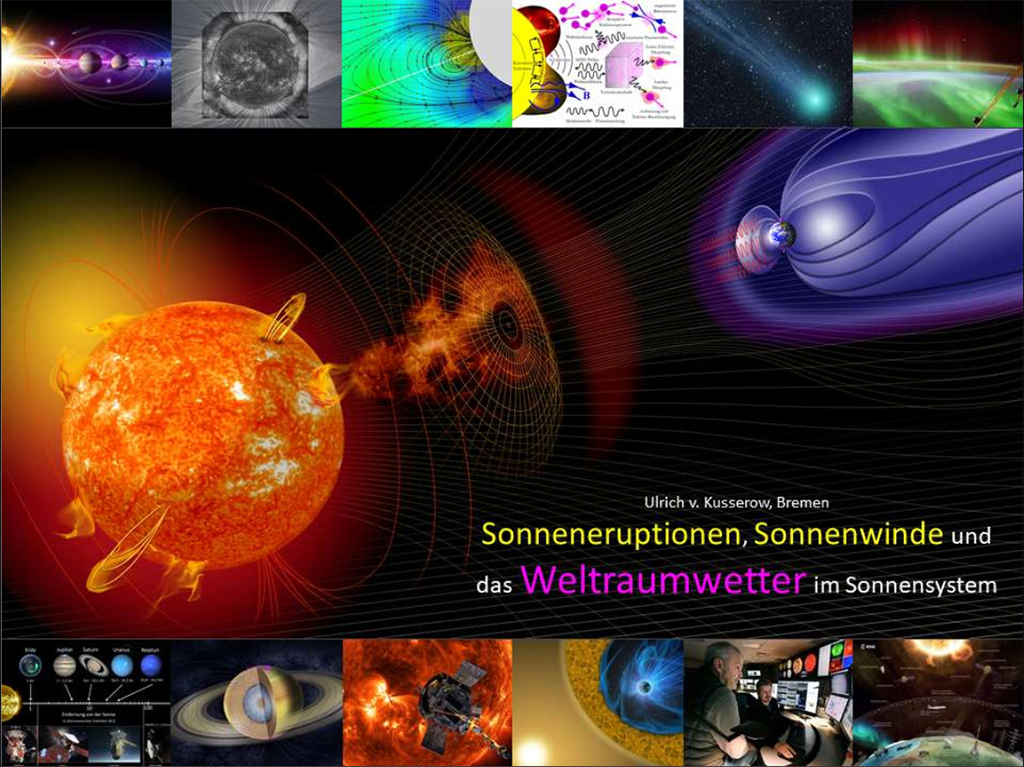From Alexander von Humboldt’s Observations to modern Heliophysics - Solar flares, Solar winds and Space weather in the Solar System
Alexander von Humboldt Lecture Series:
"From Alexander von Humboldt’s Observations to modern Heliophysics - Solar flares, Solar winds, and Space weather in the Solar System"
Guest Speaker: Ulrich v. Kusserow, Bremen
The term space weather defines and describes changes in the interplanetary medium, in the direct environment of our sun known as the heliosphere, especially of course in the magnetosphere and atmosphere of the earth. Even during the time of Alexander von Humboldt (1769-1859), natural scientists investigated the periodic occurrence and the development of large dark spots on the sun and suspected a narrower connection with the fluctuations of the earth's magnetic field and the associated variations of the fascinating polar light phenomena. But it was not until 100 years later that scientists realized that it was the enormous solar eruptions and the magnetized solar winds that were responsible for the sometimes drastic changes observed and measured, especially in the direct environment of our earth. It is the solar winds that shape the tail of comets and forms the earth's magnetic field. It is the effects of the matter and energy ejected from the solar atmosphere that decisively determine the development of life on our planet. In this lecture, which is vividly illustrated by extensive image and video material, the great significance of the influence of cosmic magnetic fields on the particularly dynamic processes in our solar system is illustrated and explained in more detail. Among other things, the physically relevant processes that can cause the solar corona to heat up to several million degrees and the strong acceleration of the magnetized solar wind will be discussed. The potentially massive influence of space weather on the Earth's climate and life on our planet can thus be made comprehensible. Telecommunication, navigation, and energy supply systems can be disturbed by it, our health or even the lives of people in airplanes or insufficiently protected astronauts in space can be endangered. The aim of the heliophysics is therefore, in particular, to research and obtain reliable predictions of the development of space weather in the Earth-Sun system.
Content of the lecture:
- Dynamic processes in our magnetic sun
- Solar eruptions and turbulent solar wind currents
- Development of comet tails, magnetic storms and polar lights
- Exploration of the space weather in the heliosphere
- Influence of space weather on the Earth's climate on our lives and individual health
Further information on this lecture can be obtained from Ulrich v. Kusserow E-mail: uvkusserow@t-online.de
Date: 4.12.19
Time: 19 pm
Place: Research V
Everyone is welcome to attend
The Alexander von Humboldt 250 Years Anniversary Lecture Series is part of the Wednesday open bilingual Kolloquium "English & Deutsch for JU, The Human Experience in Culture, Science and World Peace" by Cynthia Bolen-Nieland

Von Alexander von Humboldt und die Heliophysik - Sonneneruptionen, Sonnenwinde,das Weltraumwetter und deren Einfluß auf die Erde
Ulrich v. Kusserow, Bremen
Der Begriff Weltraumwetter definiert und beschreibt Veränderungen des interplanetaren Mediums, in dem als Heliosphäre bezeichneten direkten Umfeld unserer Sonne, speziell natürlich auch im Bereich der Magnetosphäre und Atmosphäre der Erde. Schon im Zeitalter Alexander von Humboldts (1769-1859) untersuchten die Naturforscher das periodische Auftreten und die Entwicklung großer dunkler Flecken auf der Sonne und vermuteten einen engeren Zusammenhang mit den Schwankungen des Erdmagnetfeldes und den damit einhergehenden Variationen der so faszinierenden Polarlichterscheinungen. Aber erst 100 Jahre später erkannten die Wissenschaftler, dass es die gewaltigen Sonneneruptionen und der stetig aus der Sonnenkorona abströmende turbulente magnetisierte Sonnenwind sind, die für die zu beobachtenden und messbaren teilweise drastischen Veränderungen insbesondere auch im direkten Umfeld unserer Erde verantwortlich sind. Es ist der Sonnenwind, der die Schweife der Kometen, die Aurorae mehrerer Planeten im Sonnensystem formt. Es sind die Auswirkungen der von der Sonnenatmosphäre ausgestoßenen Materie- und Energieauswürfe, die die Entwicklung des Lebens auf unserem Planeten entscheidend mitbestimmen.
In diesem durch umfangreiches Bild- und Videomaterial besonders anschaulich gestalteten Vortrag wird die große Bedeutung des Einflusses kosmischer Magnetfelder auf die besonders dynamisch ablaufenden Prozesse in unserem Sonnensystem veranschaulicht und detaillierter erläutert. Es sollen unter anderem die physikalisch relevanten Prozesse vorgestellt werden, die die Aufheizung der Sonnenkorona auf mehrere Millionen Grad sowie die starke Beschleunigung des magnetisierten Sonnenwindes bewirken können. Zielführend lässt sich dadurch schließlich der möglicherweise massive Einfluss des Weltraumwetters auf das Erdklima und das Leben auf unserem Planeten verständlich machen. Telekommunikations-, Navigations- und Energieversorgungsysteme können durch ihn gestört, die Gesundheit oder sogar das Leben von Menschen in Flugzeugen bzw. nicht ausreichend geschützten Astronauten im Weltall gefährdet werden. Zielsetzung der Heliophysiker ist daher insbesondere auch die Erforschung und Gewinnung verlässlicher Vorhersagen der Entwicklung des Weltraumwetters im Erde-Sonne-System.
Inhalt des Vortrags:
- Dynamische Prozesse in unserer magnetischen Sonne
- Solare Eruptionen und turbulente Sonnenwindströme
- Entwicklung von Kometenschweifen, magnetischen Stürmen und Polarlichtern
- Erforschung des Weltraumwetters in der Heliosphäre
- Einflussnahme des Weltraumwetters auf das Erdklima, auf unser Leben und unser Gesundheitsbefinden
- Entspannung pur
Guest Speaker: Ulrich v. Kusserow, Bremen
Date: 4.12.19
Time: 19 pm
Place: Research V
Everyone is welcome to attend